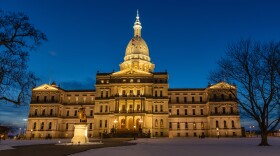Legislation to help Michigan high school athletes take advantage of name, image, and likeness rights, known as NIL, received a hearing Wednesday before the state Senate Oversight Committee.
NIL rights can lead to endorsement deals or other forms of third-party compensation for student-athletes. Supporters of the change have compared student-athletes to student musicians or social media influencers who may already be making money off those related opportunities.
High school basketball player Lance Stone, of Detroit, said having NIL rights would benefit him and others.
“Due to devotion, diligence to furthering our opportunities as student-athletes, we don’t have the ability to work after school and on weekends like most other students have. It’s because of name, image, and likeness that we can earn money and other opportunities to help us as we move forward with our careers and our lives,” Stone told committee members.
Around half of all states allow some form of NIL monetization for high school athletes, according to USA Today.
The conversation around NIL has become a popular topic of discussion since a 2021 U.S. Supreme Court ruling prevented the National Collegiate Athletic Association (NCAA) from stopping college athletes from signing deals.
As a result, some top-tier college athletes have inked major endorsements.
But Michigan High School Athletic Association Executive Director Mark Uyl said not to get hopes up for a big payday from high school sports.
“Talking to my colleagues that have passed an NIL bill, the number of opportunities has been incredibly low. So, I think there’s a little bit of bubble-bursting here that high school kids from around our state are thinking, ‘Oh, there’s going to be all of these economic opportunities.’ The reality is that it’s not true,” Uyl said Wednesday.
Under the bill, high school athletics endorsement contracts would need approval from the MHSAA, which supports the bill in its current form. Students would also need parental consent if they’re under 18.
State Senator Ed McBroom (R-Waucedah Twp) said he’s worried about what allowing NIL deals in high school athletics would mean for the athletes and for education in general.
“We’re now creating a world with so much more money and so many more pressures and politics and stuff,” McBroom said. “The perverse incentives that are going to develop through this are highly concerning to me.”
But the bill’s sponsor, state Representative Jimmie Wilson Jr. (D-Ypsilanti), pointed to various restrictions on NIL contracts listed out in the bill as checks to protect students. Those include keeping deals and official sporting events separate.
“We don’t want [student-athletes] to all of the sudden have things on their jerseys and banners in the stadium. We want to keep all that out of there because we understand this is high school athletics,” Wilson said.
The bill remains in committee. It already passed the Michigan House.




